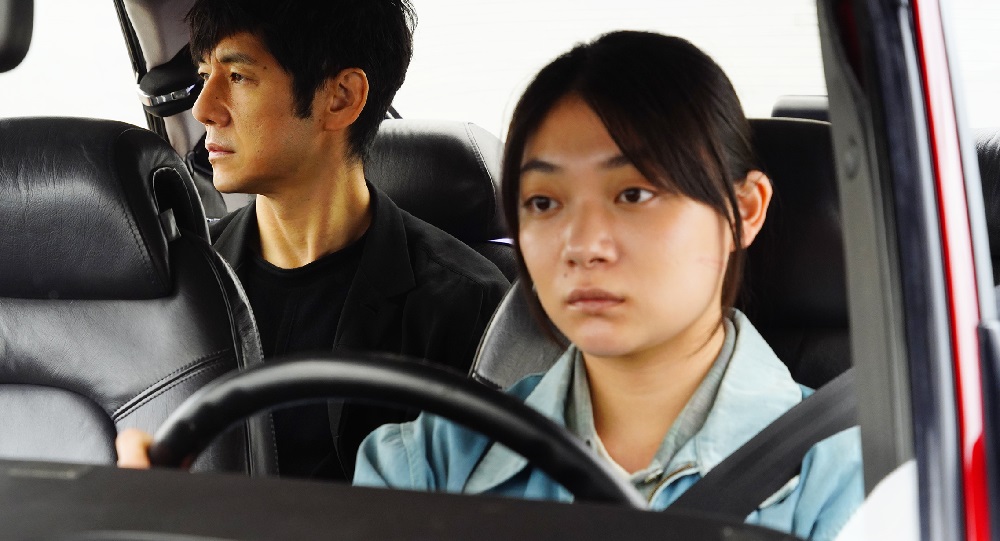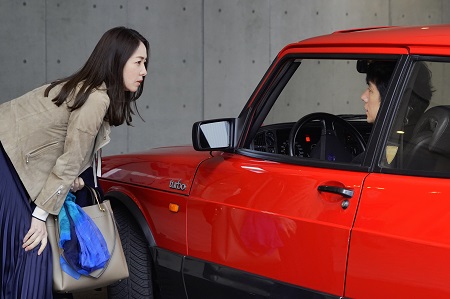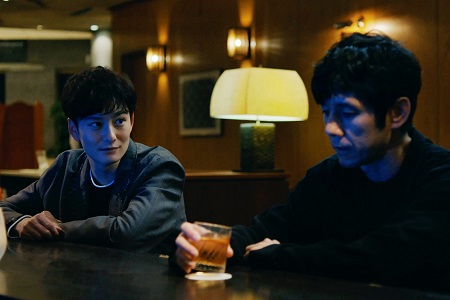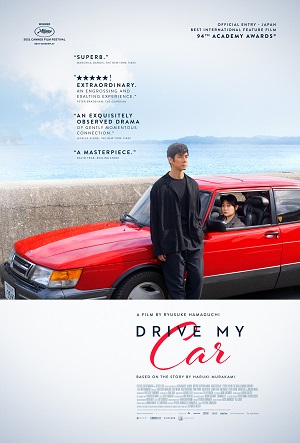
Drive My Car (2021)
by Sara Michelle Fetters - December 10th, 2021 - Four-Star Corner Movie Reviews
Drive My Car Hits the Road to Cathartic Enlightenment
Revered actor and director Yûsuke Kafuku (Hidetoshi Nishijima) has been hired to headline a production of Uncle Vanya at a theater festival in Hiroshima. It has been two years since the unexpected death of his wife Oto (Reika Kirishima), and it is her adaptation of Anton Chekhov’s text he will be handling. It will be the first time he does not act the part of Vanya himself, having chosen only to direct the production.
While in Hiroshima, the festival programmers won’t allow him to drive. Initially upset, Yûsuke surprisingly finds himself drawn to his quietly unassuming chauffeur Misaki Watari (Toko Miura). It is as if the pair experience an unspoken bond, and as the weeks pass and the hours inch closer to opening night, the moments they share driving back and forth from the hotel to the theater begin to take on a life of their own.
Based on the short story by Haruki Murakami, director Ryûsuke Hamaguchi’s (Happy Hour) devastatingly honest Drive My Car is one of 2021’s best films. It is a drama that rewards patience, moving at its own leisurely pace and going off in seemingly pointless tangents — only to seamlessly bring all of its subplots together in a storytelling miracle so authentically pure it’s breathtaking.
What’s crazy is that, even at three hours in length, the narrative isn’t any more complex than what I’ve outlined in that brief synopsis. It is what happens between the moments that Yûsuke and Misaki climb inside the vehicle where the fireworks are lit, and even they are metaphorical, that does not make them less explosive. The characters inhabiting this potpourri of human existence all have their own livelihoods, their connections to one another blossoming into a garden of mutual understanding overflowing in texture, color, and life.
I find it interesting how mundane all of this initially appears. Yûsuke runs the auditions for the production of Uncle Vanya in total silence, watching potential cast members perform as if he is analyzing every facet of their makeup, down to their DNA. Folks like popular television star Koshi Takatsuki (Masaki Okada) — with whom he shares an uncomfortable history — and mute actress Lee Yoon-a (Park Yoo-rim) end up as part of the production, with Yûsuke figuring out how to utilize each of them to achieve his and Oto’s vision Chekhov’s play.
There is more at work here than a simple examination of an artist doing what they love and assisting others to do the same. Yûsuke is still deeply wounded by Oto’s passing, and for reasons I will not disclose, he feels responsible for her death. His interactions with the cast members navigating the complexities of the play are one aspect of the purging of hidden demons he hopes to accomplish in Hiroshima, and in the process, he learns things about each of them as they become one with their roles.
These discoveries, as mundane as they may appear, are shattering when taken in concert with everything else that’s been happening. When Misaki sits behind the wheel, she sees what Yûsuke is going through, even if he won’t admit it to anyone, let alone to himself. He in turn notices that Misaki has her own psychological scars, deep wounds she rarely acknowledges while also deluding herself into believing they healed ages ago.
Their tragedies are not the same. While unexpected death haunts them both, the circumstances surrounding the loss of their loved ones couldn’t be more different. Yet grief remains universal. Loss binds them, the feeling that they are personally responsible a noose they’ve gone out of their way to snuggly wrap around their own necks, consequences be damned.
A series of events will force Yûsuke and Misaki to reexamine things in a new way. They make a connection, one that could allow them to finally move forward with their lives in a new way or force them to backtrack emotionally to the point they decide going forward isn’t worth the effort. Chekhov’s writing becomes a part of all of this, as do the actors appearing in Yûsuke’s production.
But it is these two individuals steering not-so-blindly through their conjoined pain where healing is found. Whether this statement is true or not, that is the primary mystery Drive My Car takes as much time as it needs to answer. Hamaguchi understands that it is in the tranquil stillness of catharsis and the powerful internalized embrace of selfless acceptance where truth materializes into something tactile. When answers remain ephemeral, this sort of understanding takes on an even deeper meaning: the ability to recognize fact when it has been cleverly concealed in a fiction of one’s own composition, in a book worth reading all the way to the end.
Film Rating: 4 (out of 4)







